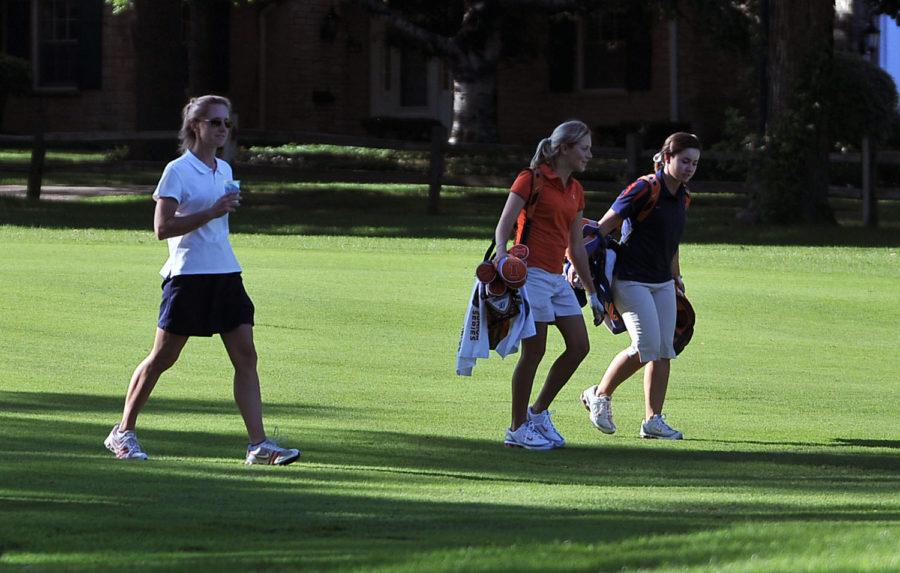Pile in the van, kids: Illinois coaches do the driving
December 9, 2015
There’s more to coaching at the college level than working with student-athletes. Some coaches have to become students themselves.
Some head and assistant coaches for smaller collegiate teams are required to take a class on driving a 15-passenger van. They learn about the safety buckles and turning, but as Illinois women’s head tennis coach Evan Clark said, it’s not “rocket science.”
After passing the course, the coaches are allowed to drive their respective teams to tournaments.
The men’s and women’s tennis, track and field, golf and cross-country teams all use vans because they don’t have enough members to fill a bus. It’s also cheaper, though head women’s golf coach Renee Slone said she did not know how much the vans save.
“I don’t know if ‘fun’ would be the right word to describe (driving the teams),” Slone said. “I certainly don’t mind it.”
Get The Daily Illini in your inbox!
The teams ride in a “turtle top” van that includes Wi-Fi, TVs and DVD players. They also have luggage racks and high ceilings to allow passengers to stand up.
The coaches look at their team’s schedule and drive to tournaments that are inefficient to fly to. The coaches factor in flight delays and travel expenses to their calculations.
Clark said that if a match is more than five hours away, his team will fly. Other teams, including Ohio State and Nebraska’s men’s tennis teams, have a six-hour limit.
“Team travel for smaller teams, like tennis, depends on the school’s budgets, but most teams travel the same way,” Carrie Smith, the director of operations for the Ohio State tennis teams, said. “It is very common for schools to travel by minivans — 12-passenger vans — to other schools for away matches that are up to six hours away. Ohio State is no exception.”
Despite some coaches’ time limits, the Illinois women’s golf team drove 7 hours and 44 minutes to Minneapolis in September for the Minnesota Invitational.
Slone’s team stopped in Elgin, Illinois, at teammate Stephanie Miller’s house. A week later, the Illini rode in their van for 7 hours and 13 minutes to Knoxville, Tennessee, for the Mercedes-Benz Collegiate.
Slone has experience with long road trips: She used to drive herself to amateur and professional golf competitions. She once drove 24 hours straight from Phoenix to Peoria, Illinois.
Clark said his team takes a charter bus to Minnesota, because the trip includes several days of matches and traveling.
Players spend those hours in the van sleeping, doing homework, watching game film or strategizing. The coaches, who will alternate between driving, may meet with players individually, strategize or scout.
Coaches keep any receipts after using a University credit card for food and gas. It takes money out of the teams’ budgets, but they are later reimbursed.
“The only time (driving long distances) get’s a little bit tougher is when we finish a match, and you’re driving late,” said Clark, who prefers to drink coffee during the longer rides. “That’s the only time it get’s really, really challenging … It could be snowing, or raining or something like that.”
These driving conditions do raise some safety concerns.
“Safe transportation of student-athletes may be an oft-neglected risk-management issue facing college athletics administrators,” Dr. David Lavetter, a professor of sports management at Arkansas University, concluded in his 2005 case study of coaches driving vans. “Even when an event is properly organized and managed, an accident can immediately turn the trip into a disaster. Sadly, too many NCAA institutions have been involved in team-related van accidents.”
In 2000, the coach and two players of the Tennessee-Martin baseball team were critically injured after its coach, Vicotor Cates, pulled out in front of an oncoming truck at the intersection of two highways and stopped for an “unknown reason”.
Lavetter recommends ridding schools of 15-passenger vans and from having their coaches driving any vehicles. He also recommends not traveling between midnight and 6 a.m.
“They keep talking about not letting the coaches (drive vans),” Clark said. “For the most part, if we don’t feel like we should be driving, we make other arrangements.”
?@32Ryno







